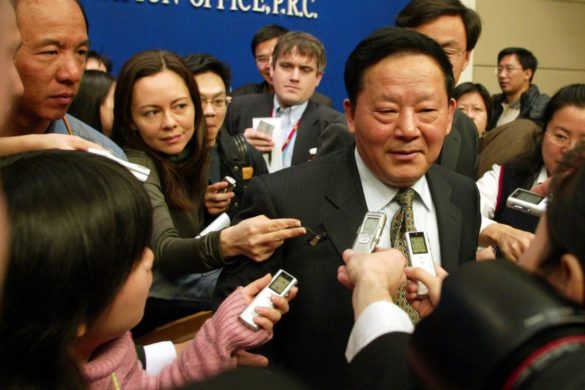
US seeking to ‘colonise’ China’s economy with trade deal, says veteran economic policymaker Li Deshui
A veteran Chinese economic policymaker has revealed certain United States demands made during trade negotiations with China that were later rejected by Beijing, confirming previous media reports and shedding light on mainstream thinking about US policy among China’s economic officials.
Li Deshui, a former chief of China’s statistics bureau, wrote that the US side had specifically demanded that China amend its domestic laws and proposed to establish a permanent bilateral office to debate Beijing’s economic policies, according to an article obtained by the South China Morning Post.
In addition, Washington had requested a one-sided enforcement mechanism that allowed it to impose sanctions on China if it was unhappy with economic policies, but China could not retaliate, Li said. The US had also tried to restrict China’s hi-tech industry and state-owned enterprises and to urge China to open up its financial sector and markets “unconditionally”, Li said.
It is the first time that a senior figure in Beijing has revealed US demands in trade talks that failed in May after Beijing rejected the US proposals.
This is a wholly unfair treaty that seeks to colonise China’s economy. If this is accepted, then it is giving up China’s development path
Li Deshui
Beijing and Washington resumed talks on Thursday, but prospects of the world’s two largest economies reaching a comprehensive deal are dim. However, there were signs of de-escalation recently when China agreed to resume the purchase of some US farm products and US President Donald Trump agreed to lift tariffs on 400 Chinese goods.
For Li, who worked as a senior researcher within the Chinese government and as the country’s economic planning official, it was impossible for Beijing to agree to any of the US demands as they were asking China to “give up its economic sovereignty”.
“This is a wholly unfair treaty that seeks to colonise China’s economy. If this is accepted, then it is giving up China’s development path, giving up China’s rights of development, and making China a vassal of the US,” Li wrote in an article reviewing China’s economic achievements and setbacks in the seven decades since the People’s Republic of China was founded as well as challenges ahead.
“It’s almost 2020 and the US is trying to bully China. The US is trying to get what it cannot get in economic competition through a piece of paper … it’s absurd. The Chinese government and the Chinese people will never agree!” Li wrote.
Li said that the trade war launched by Trump against China was part of a broad Washington strategy to contain China’s rise and prevent any challenge to US hegemony.
“The China-US trade war, in a nutshell, is that the US has started a comprehensive strategy to contain China,” Li wrote. “It is a comprehensive political struggle, and the trade war is just part of it.”
The US has changed its China strategy, and the struggles and disputes between China and US over trade and other issues will be long-term
Li Deshui
Li wrote that US relations with Taiwan and its navy patrols near the South China Sea were all part of Washington’s broad strategy of thwarting China’s rise.
Li’s view represents a conservative but influential strain of thought in Beijing that perceives the trade demands and tariffs from Washington as part of a US strategy to hurt China and overthrow the Communist Party.
“The US has changed its China strategy, and the struggles and disputes between China and US over trade and other issues will be long-term,” Li wrote. “There will be good moments and bad moments as well as fights and talks … just like the Korean war [in 1950s].”
Li warned that the US would use “financial warfare” to hit China and use its ideological infiltration to overthrow China’s regime. “The US has done so to cause the collapse of the Soviet Union and the big change in East Europe … they will try it again to China.”In an interview with the South China Morning Post on Thursday, Michael Pillsbury, an outside trade adviser to US President Donald Trump, blamed China for stalling trade talks in May, adding the US was ready to ramp up pressure on China if a deal was not reached soon.
“It was very close and then something mysterious happened. China reneged,” Pillsbury said. “The mystery is the hardliners [in Beijing]. They apparently were not aware of the 150-page deal. They somehow became aware of it in April. Some new players got involved in Beijing and next thing we know their reneging took place.”
Jin Canrong, an international relations professor at Renmin University of China in Beijing, said that China has already agreed to 80 per cent of US demands, but the remainder was seen as an infringement on its sovereignty.
“It’s not a 100 per cent thing, and it’s possible that the negotiations will collapse,” Jin said on his social media account earlier this month. “The major reason is that China has already offered to make huge concessions.”